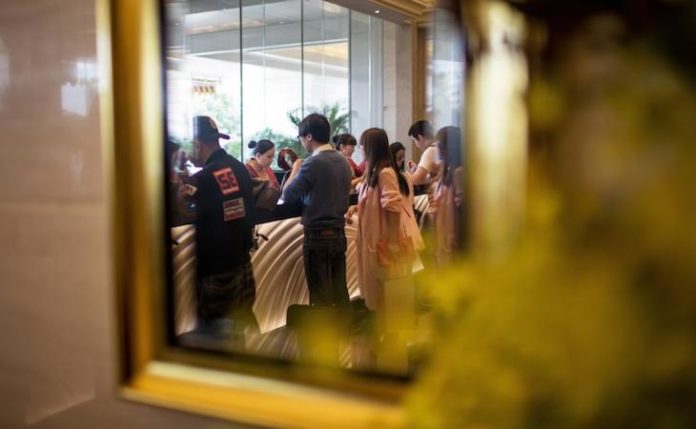The city’s bookings for hotel rooms by visitors coming here for the three-day Labour Day holiday starting on May 1 is weaker than the same period last year, at a time when fewer package tourists from Mainland China travelling here is also expected, local hospitality trade chambers say. The typical fully booked hotel room scenario so typical here on China’s national holidays is not happening for the upcoming Labour Day holiday. An expected drop in the number of package tours from the Mainland has also dragged down bookings for the city’s 3-star hotels, the president of the Macau Hoteliers & Innkeepers Association, Chan Chi Kit, told Business Daily. “It [fewer bookings] actually reflects the combined influence of the 24-hour border crossing operational since last year, as well as the trend for more Mainlanders preferring to travel to East or Southeast Asia during the vacation,” Mr. Chan remarked. “Some of the city’s 3-star hotels, which have tied up with the accommodation plans of Chinese package tours, have also seen fewer bookings as there is a reduced number of Hong Kong-Macau joint tours coming here,” Mr. Chan added, “The earlier Occupy Central movement and their anti-parallel imports protests did make a [negative] impression on Chinese tourists.” Fewer package tours Andy Wu Keng Kuong, president of the Macau Travel Industry Council, also predicts that the city will see a fall in the number of Chinese package tourists arriving during the Labour Day holiday, although this likely reduction means that overall visitors coming here may not see much change when compared to the same period as last year. The Travel Industry Council of Hong Kong says it expects an around 10 per cent fall in the number of Chinese package tours travelling to the city during the three-day holiday, meaning that only around 250 tours will go there in the period. “We also expect a similar fall percentage in the number of Chinese package tours coming here during the Labour Day vacation, as some of them come on a joint Hong Kong-Macau route,” Mr. Wu told us. “But as Chinese tourists travelling on package tours occupy only some forty per cent of our overall Chinese visitors, we may see that the eventual visitation figures for the Labour Day holiday will not vary much compared to last year.” The city’s 3-star hotels, some infamous for overpriced rates that could top MOP3,000 (US$376) will now also entertain a more “rational” rate, Mr. Wu added. “Now, for the city’s 3-star and 4-star hotels, the average is over MOP1,000 patacas,” Mr. Wu said. “In the past, as we know, some 3-star hotel rooms here were priced at up to MOP3,000 a night during holiday [periods] – which is now no longer the case.” Cheaper rooms The hoteliers association’s president roughly estimated that the average occupancy rate for Macau’s 3-star to 5-star hotels in April is at around 80 per cent, an improved performance when compared to March – a period he termed the “worst” month of this year so far. “Since the Chinese New Year holiday [in February], the hotels here have already seen a declining occupancy rate,” Chan Chi Kit said. “And then the casino operators have started to offer cheaper accommodation packages, which, in turn, many other hotels have also followed suit offering cheaper room rates for advance bookings that lasted until mid-April.” Mr. Chan further estimated that the city’s average room rate of 3-star to 5-star hotels for the upcoming Labour Day holiday may drop by 15 per cent year-on-year. The average room rate for Macau’s 3-star to 5-star hotels has started to register a year-on-year decline since February, data from the Macau Hotel Association shows: in that month alone, the average room rate dropped 3.28 per cent to MOP1,787.8, a fall mainly prompted by the cheaper room rates of 3-star and 4-star hotels. For the first three months of this year, the average room rate stood at MOP1,618, representing a year-on-year drop of 1.36 per cent. The occupancy rate of the 3-star to 5-star hotels in the period is 82.47 per cent, a drop of 8.54 percentage points when compared with the same period last year.
—
























